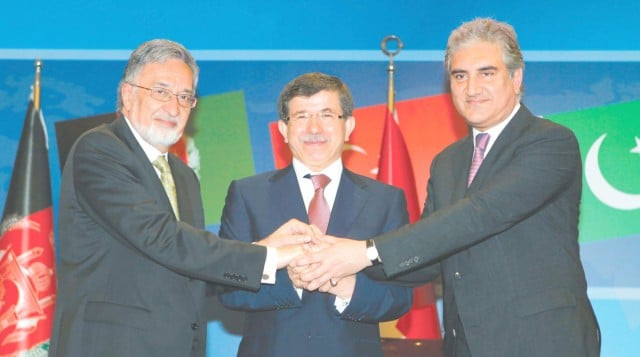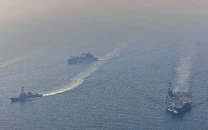Key Taliban leaders have fled AfPak region: Qureshi

Pakistan-Afghanistan relations had seen a “dramatic shift” since Pakistan returned to civilian-led democracy, Qureshi added after three-way talks with Turkey designed to help dispel years of mistrust between Kabul and Islamabad.
“(Taliban leaders) have fled the region because of the very successful military operations Pakistan has undertaken in the tribal belt, in Swat and Malakand,” Qureshi told a joint news conference with his Afghan and Turkish counterparts in Istanbul after the meeting.
“My brother from Pakistan, the foreign minister, expressed full support for the peace process and Pakistan and Afghanistan will work together to achieve a peaceful solution to this conflict,” Afghanistan’s Foreign Minister Zalmay Rasul said when asked if the Taliban leadership was in Pakistan or Afghanistan.
Asked whether the Afghan government had given Pakistan any assurances over India’s strong diplomatic presence and links with Afghanistan, developments which have sparked Pakistani fears of encirclement, Qureshi said a “different situation” now existed.
“Our political relations have improved in the last two years. There is greater sharing of intelligence taking place. There is greater understanding between the military leaderships of the two countries,” he said. ISTANBUL
Pakistan’s military operations in tribal areas have forced some important Taliban leaders to flee outside Pakistan and Afghanistan, Foreign Minister Shah Mehmood Qureshi said on Monday.
Pakistan-Afghanistan relations had seen a “dramatic shift” since Pakistan returned to civilian-led democracy, Qureshi added after three-way talks with Turkey designed to help dispel years of mistrust between Kabul and Islamabad.
“(Taliban leaders) have fled the region because of the very successful military operations Pakistan has undertaken in the tribal belt, in Swat and Malakand,” Qureshi told a joint news conference with his Afghan and Turkish counterparts in Istanbul after the meeting.
“My brother from Pakistan, the foreign minister, expressed full support for the peace process and Pakistan and Afghanistan will work together to achieve a peaceful solution to this conflict,” Afghanistan’s Foreign Minister Zalmay Rasul said when asked if the Taliban leadership was in Pakistan or Afghanistan.
Asked whether the Afghan government had given Pakistan any assurances over India’s strong diplomatic presence and links with Afghanistan, developments which have sparked Pakistani fears of encirclement, Qureshi said a “different situation” now existed.
“Our political relations have improved in the last two years. There is greater sharing of intelligence taking place. There is greater understanding between the military leaderships of the two countries,” he said.
Analysts remain skeptical about the outcome of such meetings.
“The loyal jirga was a failure and all meetings that do not include the Taliban will be a failure,” said foreign policy analyst Zafar Hilaly. “Nothing ever happen, there can be no solution to the Afghan war until prime stakeholders – the US and Taliban – don’t talk,” he told The Express Tribune.
Former ambassador to Afghanistan, Rustam Shah Mohmand also shares Hilaly’s views. “You need to understand the dynamics of the problems in Afghanistan. When so much blood has been lost, how can meetings between officials solve anything?” he said. The only solution is that foreign forces are replaced with UN peacekeepers, and that too, for countries that do not have a stake in Afghanistan.
(WITH ADDITIONAL REPORTING BY ZEHRA ABID)
Published in the Express Tribune, June 8th, 2010.



















COMMENTS
Comments are moderated and generally will be posted if they are on-topic and not abusive.
For more information, please see our Comments FAQ